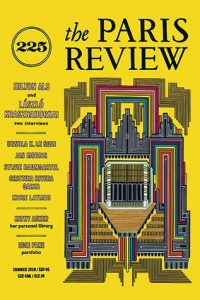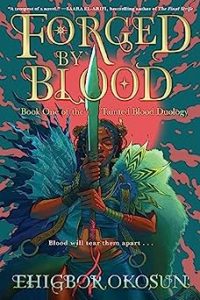Alexandra Pierce Reviews Self-Portrait with Nothing by Aimee Pokwatka
 Self-Portrait with Nothing, Aimee Pokwatka (Tordotcom 978-1-25082-084-6, $26.99, 304pp, hc) October 2022. Cover by Jaya Miceli.
Self-Portrait with Nothing, Aimee Pokwatka (Tordotcom 978-1-25082-084-6, $26.99, 304pp, hc) October 2022. Cover by Jaya Miceli.
The idea of a multiverse has spawned countless explorations of what-if: what are the consequences of this choice over that? Is my alternative version living a better life? Can I access those alternate worlds, and what happens if I do? Until now, my favorite treatment of this trope was Jo Walton’s My Real Children from 2015. Aimee Pokwatka’s debut novel is now firmly up there as a contender, too.
Self-Portrait with Nothing by Aimee Pokwatk opens with a disappearance: a famous, and famously reclusive, artist, Ula Frost, is reported missing by her assistant. Gordon Priddy has never actually met Frost, but he is accustomed to a weekly phone call telling him what to do. He hasn’t heard from her in three weeks, so he reports her disappearance to the police. The general lack of information about Frost is, naturally, frustrating to the police, and doesn’t bode well for any investigation. What turns up is that Frost has a cult following thanks to a rumor: that portraits she paints are said to somehow unlock alternate versions of their subjects.
The story swings to focus on Pepper Rafferty, a forensic anthropologist currently working on skeletal remains recently found on the edge of her town, as well as on a collection of archaic-period remains from Kentucky. Her work is interrupted by a journalist from a fine-arts magazine who has discovered Pepper’s secret: that her biological mother is Ula Frost. Pepper has never had contact with her, having been literally left at the door of her adoptive mothers’ house as a newborn; her mothers don’t know her parents’ identity, nor that Pepper herself suspects who her mother is. This tangle of secrets begins to unravel following Frost’s disappearance, because Pepper is the primary beneficiary of her will. Given Frost’s oddness, it comes as no surprise that there are conditions on the will. These conditions, plus the journalist’s single-mindedness, lead Pepper to investigating more about both Frost’s life, and her apparent disappearance.
At about the halfway mark, there is a change in the pace of the novel. Pepper’s exploration has involved trying to find places that Frost has lived, or had connections to, and has been mostly frustrating. It leads, though, to confrontations with the shadowy Everett Group: people who are interested in Frost’s art for nefarious purposes. After all, if the portraits she paints really do connect somehow to parallel worlds, what use could that be put to? It also turns out that Frost has not died, and that Frost’s portraiture really does do something weird, which she has been manipulating to her own ends. Biological mother-daughter reunions so late in life are rarely going to be straightforward, and given the circumstances – on top of Frost’s famously irascible character – their time together is fraught at best, and hampered by the Everett Group’s possible criminality.
Throughout Self-Portrait with Nothing Pepper spends a lot of time considering what alternate versions of herself might be like. Whether a different job, or a different partner, or having made different decisions would result in a different person. Perhaps more poignantly, she wonders whether ‘different’ would be ‘better’. Pepper’s insecurity often has her imagine a more confident, more quick-witted, more-everything-positive version of herself. Nonetheless, she persists in looking for answers, and her determination in the face of her perceived failings is a trait that I deeply appreciated about her. As well, despite her insecurity and worry that other versions of herself are better, she also knows her own worth as a person, which is a tricky balance to manage. She could easily have become a character wallowing in self-pity, but she never does, which prevents the novel from being too navel-gaze-y and narrow.
Self-Portrait with Nothing is a worthy addition to the multiverse subgenre, a rich exploration of families of all different sorts, and a cracking mystery.
Alexandra Pierce reads, writes, podcasts, cooks and knits; she’s Australian and a feminist. She was a host of the Hugo Award winning podcast Galactic Suburbia for a decade; her new podcast is all about indie bookshops and is called Paper Defiance. Alex has edited two award-winning non-fiction anthologies, Letters to Tiptree and Luminscent Threads: Connections to Octavia E Butler. She reviews a wide range of books at www.randomalex.net.
This review and more like it in the November 2022 issue of Locus.
 While you are here, please take a moment to support Locus with a one-time or recurring donation. We rely on reader donations to keep the magazine and site going, and would like to keep the site paywall free, but WE NEED YOUR FINANCIAL SUPPORT to continue quality coverage of the science fiction and fantasy field.
While you are here, please take a moment to support Locus with a one-time or recurring donation. We rely on reader donations to keep the magazine and site going, and would like to keep the site paywall free, but WE NEED YOUR FINANCIAL SUPPORT to continue quality coverage of the science fiction and fantasy field.
©Locus Magazine. Copyrighted material may not be republished without permission of LSFF.








